Orientation Strategies: Reflective Learning in Higher Education
VerifiedAdded on 2023/06/18
|8
|2116
|84
Report
AI Summary
This report provides an overview of strategies for achieving success in higher education, focusing on the importance of orientation, reflective learning, and skills development. It explores the Gibbs model of reflection, emphasizing the development of communication, problem-solving, numeracy, and ICT skills. The report also discusses the benefits of formative feedback in enhancing student understanding and motivation, along with the advantages of formative assessment in defining learning goals, increasing rigor, and improving academic achievement. Furthermore, a SWOT analysis is presented to assess individual strengths, weaknesses, opportunities, and threats related to career development. The report concludes by highlighting the need for continuous improvement and adaptation to the evolving demands of the job market. Desklib offers a wealth of resources, including past papers and solved assignments, to support students in their academic journey.
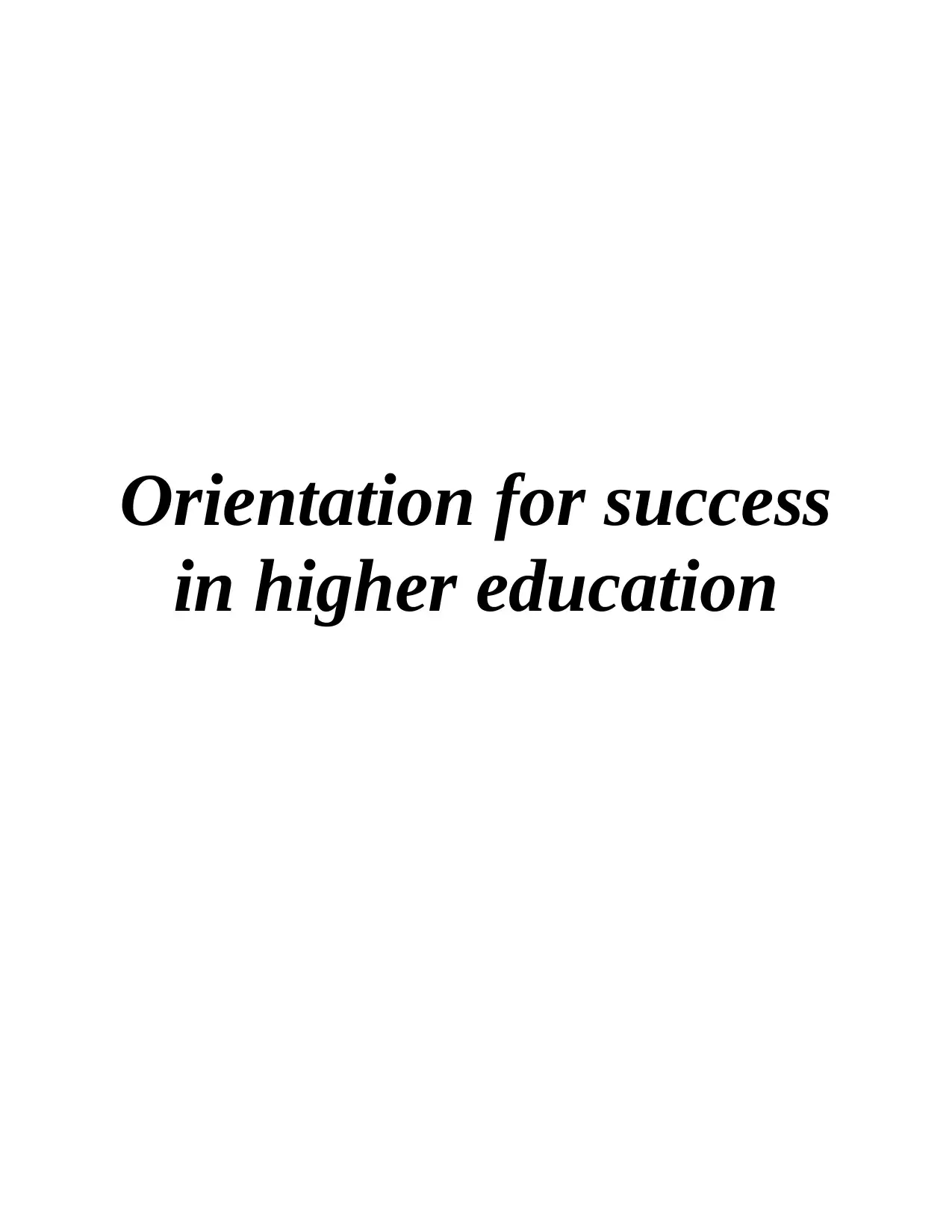
Orientation for success
in higher education
in higher education
Paraphrase This Document
Need a fresh take? Get an instant paraphrase of this document with our AI Paraphraser
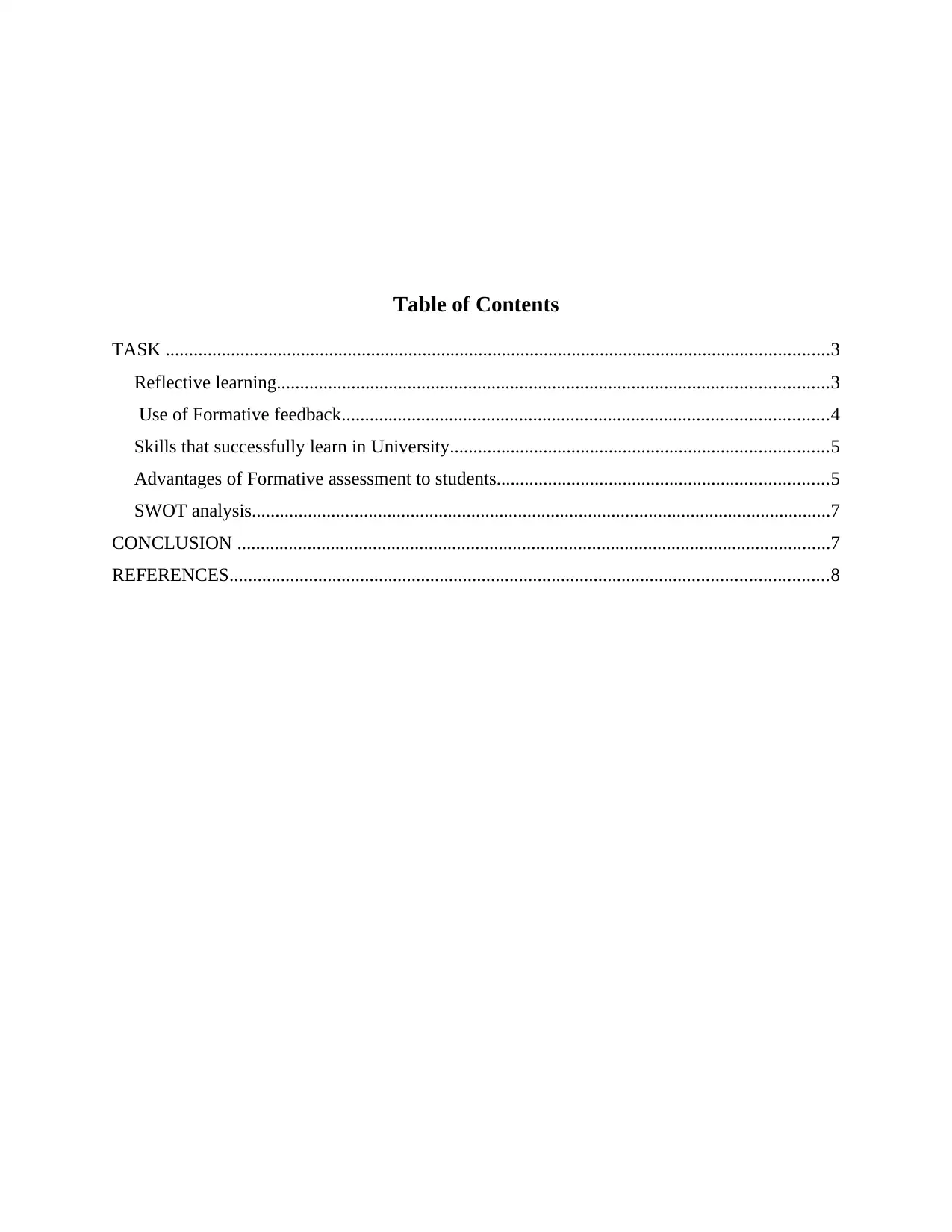
Table of Contents
TASK ..............................................................................................................................................3
Reflective learning......................................................................................................................3
Use of Formative feedback........................................................................................................4
Skills that successfully learn in University.................................................................................5
Advantages of Formative assessment to students.......................................................................5
SWOT analysis............................................................................................................................7
CONCLUSION ...............................................................................................................................7
REFERENCES................................................................................................................................8
TASK ..............................................................................................................................................3
Reflective learning......................................................................................................................3
Use of Formative feedback........................................................................................................4
Skills that successfully learn in University.................................................................................5
Advantages of Formative assessment to students.......................................................................5
SWOT analysis............................................................................................................................7
CONCLUSION ...............................................................................................................................7
REFERENCES................................................................................................................................8
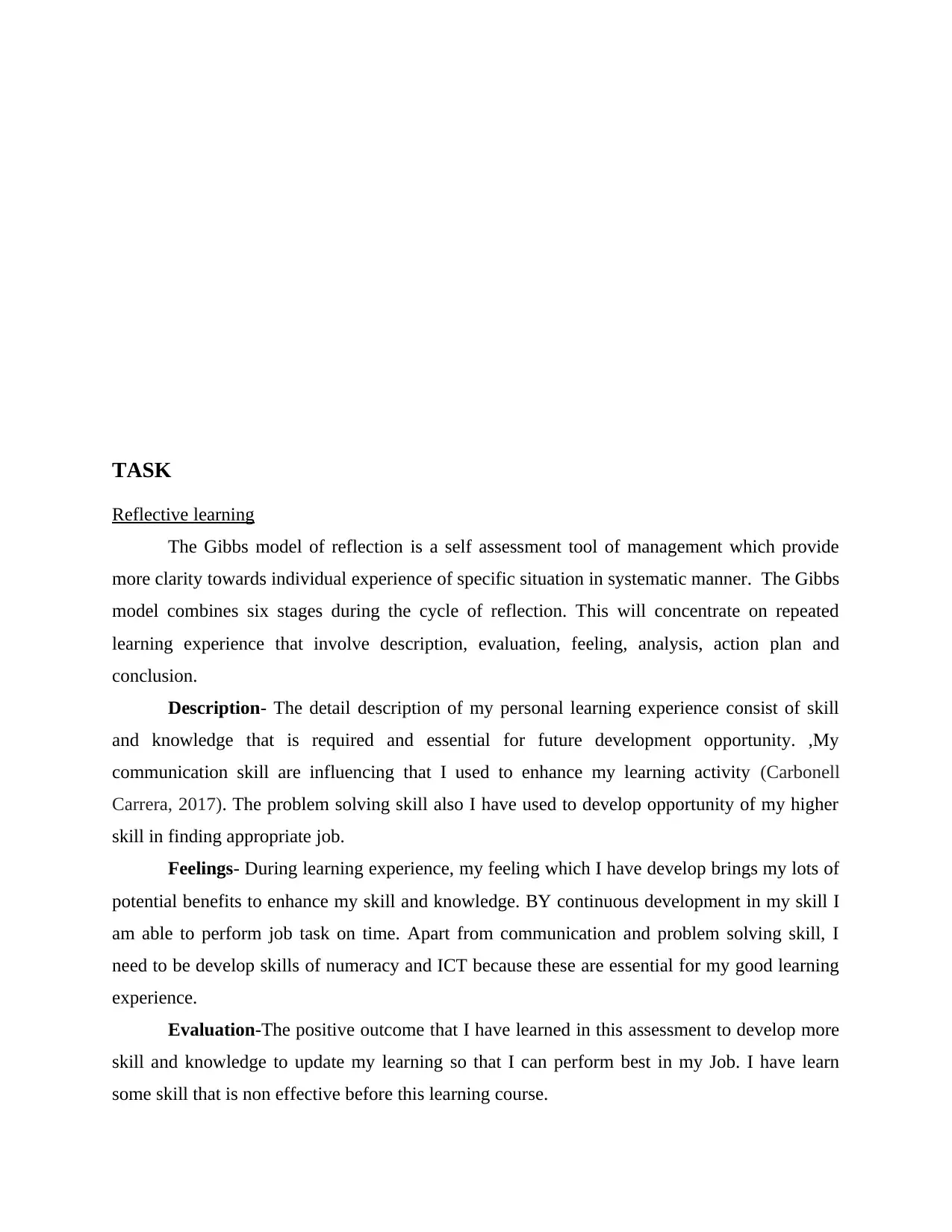
TASK
Reflective learning
The Gibbs model of reflection is a self assessment tool of management which provide
more clarity towards individual experience of specific situation in systematic manner. The Gibbs
model combines six stages during the cycle of reflection. This will concentrate on repeated
learning experience that involve description, evaluation, feeling, analysis, action plan and
conclusion.
Description- The detail description of my personal learning experience consist of skill
and knowledge that is required and essential for future development opportunity. ,My
communication skill are influencing that I used to enhance my learning activity (Carbonell
Carrera, 2017). The problem solving skill also I have used to develop opportunity of my higher
skill in finding appropriate job.
Feelings- During learning experience, my feeling which I have develop brings my lots of
potential benefits to enhance my skill and knowledge. BY continuous development in my skill I
am able to perform job task on time. Apart from communication and problem solving skill, I
need to be develop skills of numeracy and ICT because these are essential for my good learning
experience.
Evaluation-The positive outcome that I have learned in this assessment to develop more
skill and knowledge to update my learning so that I can perform best in my Job. I have learn
some skill that is non effective before this learning course.
Reflective learning
The Gibbs model of reflection is a self assessment tool of management which provide
more clarity towards individual experience of specific situation in systematic manner. The Gibbs
model combines six stages during the cycle of reflection. This will concentrate on repeated
learning experience that involve description, evaluation, feeling, analysis, action plan and
conclusion.
Description- The detail description of my personal learning experience consist of skill
and knowledge that is required and essential for future development opportunity. ,My
communication skill are influencing that I used to enhance my learning activity (Carbonell
Carrera, 2017). The problem solving skill also I have used to develop opportunity of my higher
skill in finding appropriate job.
Feelings- During learning experience, my feeling which I have develop brings my lots of
potential benefits to enhance my skill and knowledge. BY continuous development in my skill I
am able to perform job task on time. Apart from communication and problem solving skill, I
need to be develop skills of numeracy and ICT because these are essential for my good learning
experience.
Evaluation-The positive outcome that I have learned in this assessment to develop more
skill and knowledge to update my learning so that I can perform best in my Job. I have learn
some skill that is non effective before this learning course.
⊘ This is a preview!⊘
Do you want full access?
Subscribe today to unlock all pages.

Trusted by 1+ million students worldwide
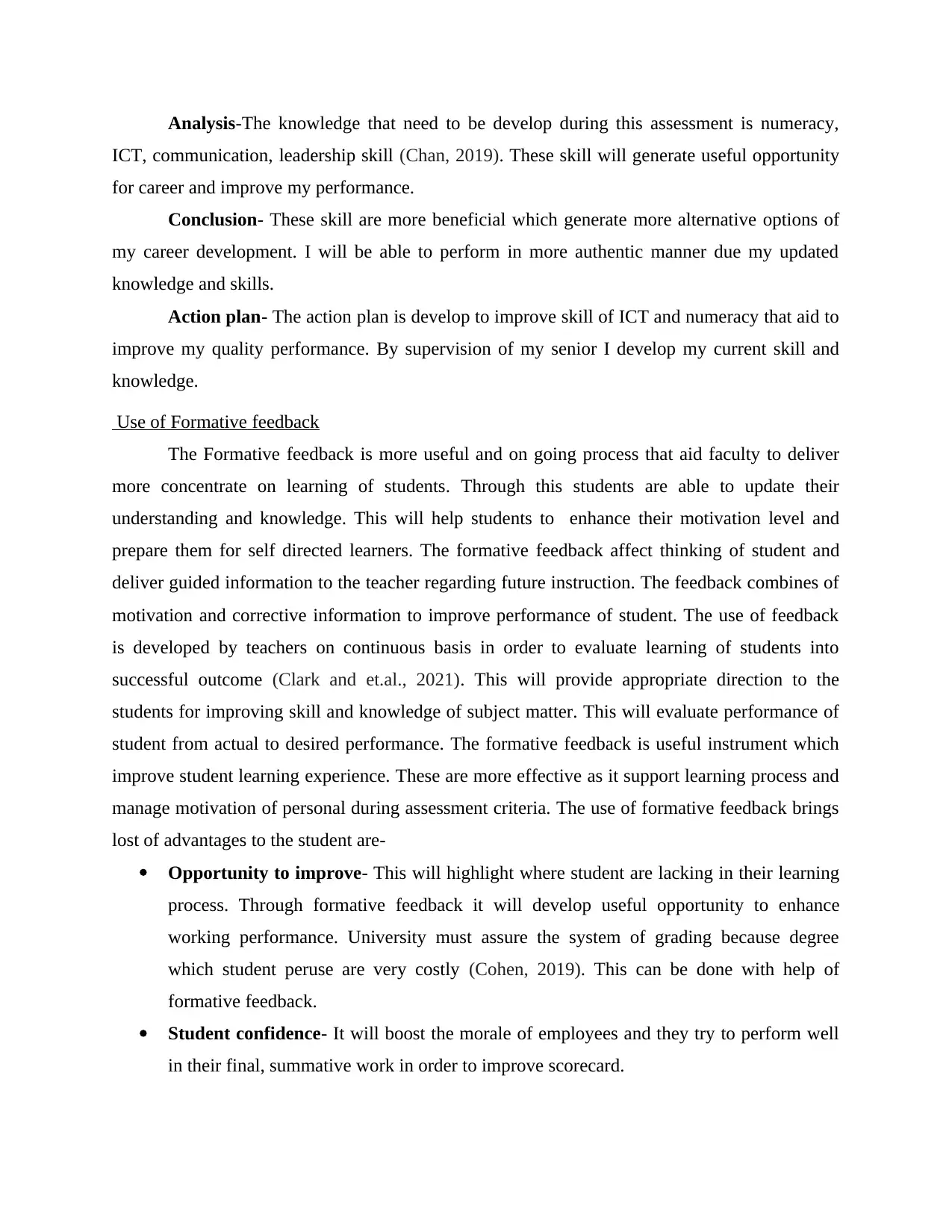
Analysis-The knowledge that need to be develop during this assessment is numeracy,
ICT, communication, leadership skill (Chan, 2019). These skill will generate useful opportunity
for career and improve my performance.
Conclusion- These skill are more beneficial which generate more alternative options of
my career development. I will be able to perform in more authentic manner due my updated
knowledge and skills.
Action plan- The action plan is develop to improve skill of ICT and numeracy that aid to
improve my quality performance. By supervision of my senior I develop my current skill and
knowledge.
Use of Formative feedback
The Formative feedback is more useful and on going process that aid faculty to deliver
more concentrate on learning of students. Through this students are able to update their
understanding and knowledge. This will help students to enhance their motivation level and
prepare them for self directed learners. The formative feedback affect thinking of student and
deliver guided information to the teacher regarding future instruction. The feedback combines of
motivation and corrective information to improve performance of student. The use of feedback
is developed by teachers on continuous basis in order to evaluate learning of students into
successful outcome (Clark and et.al., 2021). This will provide appropriate direction to the
students for improving skill and knowledge of subject matter. This will evaluate performance of
student from actual to desired performance. The formative feedback is useful instrument which
improve student learning experience. These are more effective as it support learning process and
manage motivation of personal during assessment criteria. The use of formative feedback brings
lost of advantages to the student are-
Opportunity to improve- This will highlight where student are lacking in their learning
process. Through formative feedback it will develop useful opportunity to enhance
working performance. University must assure the system of grading because degree
which student peruse are very costly (Cohen, 2019). This can be done with help of
formative feedback.
Student confidence- It will boost the morale of employees and they try to perform well
in their final, summative work in order to improve scorecard.
ICT, communication, leadership skill (Chan, 2019). These skill will generate useful opportunity
for career and improve my performance.
Conclusion- These skill are more beneficial which generate more alternative options of
my career development. I will be able to perform in more authentic manner due my updated
knowledge and skills.
Action plan- The action plan is develop to improve skill of ICT and numeracy that aid to
improve my quality performance. By supervision of my senior I develop my current skill and
knowledge.
Use of Formative feedback
The Formative feedback is more useful and on going process that aid faculty to deliver
more concentrate on learning of students. Through this students are able to update their
understanding and knowledge. This will help students to enhance their motivation level and
prepare them for self directed learners. The formative feedback affect thinking of student and
deliver guided information to the teacher regarding future instruction. The feedback combines of
motivation and corrective information to improve performance of student. The use of feedback
is developed by teachers on continuous basis in order to evaluate learning of students into
successful outcome (Clark and et.al., 2021). This will provide appropriate direction to the
students for improving skill and knowledge of subject matter. This will evaluate performance of
student from actual to desired performance. The formative feedback is useful instrument which
improve student learning experience. These are more effective as it support learning process and
manage motivation of personal during assessment criteria. The use of formative feedback brings
lost of advantages to the student are-
Opportunity to improve- This will highlight where student are lacking in their learning
process. Through formative feedback it will develop useful opportunity to enhance
working performance. University must assure the system of grading because degree
which student peruse are very costly (Cohen, 2019). This can be done with help of
formative feedback.
Student confidence- It will boost the morale of employees and they try to perform well
in their final, summative work in order to improve scorecard.
Paraphrase This Document
Need a fresh take? Get an instant paraphrase of this document with our AI Paraphraser
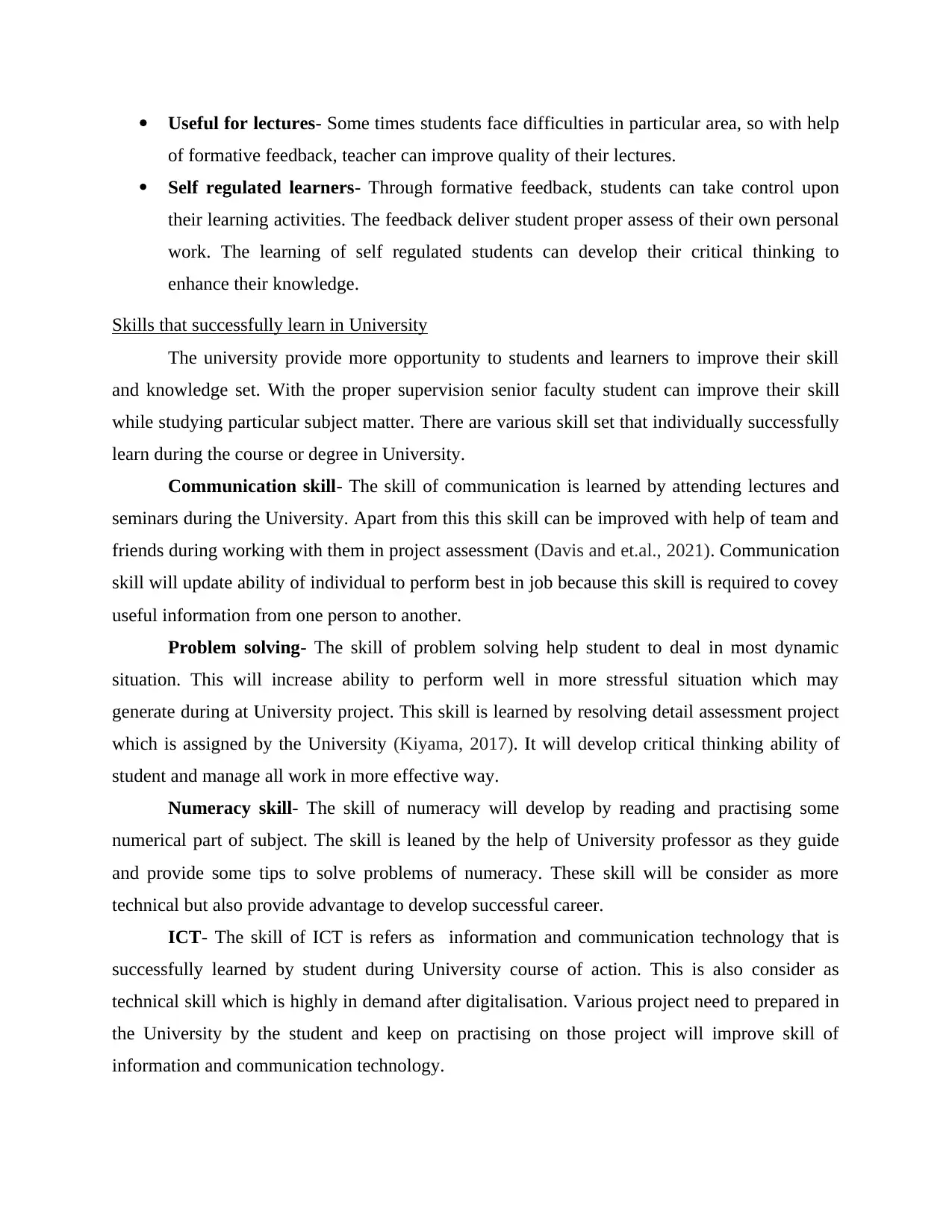
Useful for lectures- Some times students face difficulties in particular area, so with help
of formative feedback, teacher can improve quality of their lectures.
Self regulated learners- Through formative feedback, students can take control upon
their learning activities. The feedback deliver student proper assess of their own personal
work. The learning of self regulated students can develop their critical thinking to
enhance their knowledge.
Skills that successfully learn in University
The university provide more opportunity to students and learners to improve their skill
and knowledge set. With the proper supervision senior faculty student can improve their skill
while studying particular subject matter. There are various skill set that individually successfully
learn during the course or degree in University.
Communication skill- The skill of communication is learned by attending lectures and
seminars during the University. Apart from this this skill can be improved with help of team and
friends during working with them in project assessment (Davis and et.al., 2021). Communication
skill will update ability of individual to perform best in job because this skill is required to covey
useful information from one person to another.
Problem solving- The skill of problem solving help student to deal in most dynamic
situation. This will increase ability to perform well in more stressful situation which may
generate during at University project. This skill is learned by resolving detail assessment project
which is assigned by the University (Kiyama, 2017). It will develop critical thinking ability of
student and manage all work in more effective way.
Numeracy skill- The skill of numeracy will develop by reading and practising some
numerical part of subject. The skill is leaned by the help of University professor as they guide
and provide some tips to solve problems of numeracy. These skill will be consider as more
technical but also provide advantage to develop successful career.
ICT- The skill of ICT is refers as information and communication technology that is
successfully learned by student during University course of action. This is also consider as
technical skill which is highly in demand after digitalisation. Various project need to prepared in
the University by the student and keep on practising on those project will improve skill of
information and communication technology.
of formative feedback, teacher can improve quality of their lectures.
Self regulated learners- Through formative feedback, students can take control upon
their learning activities. The feedback deliver student proper assess of their own personal
work. The learning of self regulated students can develop their critical thinking to
enhance their knowledge.
Skills that successfully learn in University
The university provide more opportunity to students and learners to improve their skill
and knowledge set. With the proper supervision senior faculty student can improve their skill
while studying particular subject matter. There are various skill set that individually successfully
learn during the course or degree in University.
Communication skill- The skill of communication is learned by attending lectures and
seminars during the University. Apart from this this skill can be improved with help of team and
friends during working with them in project assessment (Davis and et.al., 2021). Communication
skill will update ability of individual to perform best in job because this skill is required to covey
useful information from one person to another.
Problem solving- The skill of problem solving help student to deal in most dynamic
situation. This will increase ability to perform well in more stressful situation which may
generate during at University project. This skill is learned by resolving detail assessment project
which is assigned by the University (Kiyama, 2017). It will develop critical thinking ability of
student and manage all work in more effective way.
Numeracy skill- The skill of numeracy will develop by reading and practising some
numerical part of subject. The skill is leaned by the help of University professor as they guide
and provide some tips to solve problems of numeracy. These skill will be consider as more
technical but also provide advantage to develop successful career.
ICT- The skill of ICT is refers as information and communication technology that is
successfully learned by student during University course of action. This is also consider as
technical skill which is highly in demand after digitalisation. Various project need to prepared in
the University by the student and keep on practising on those project will improve skill of
information and communication technology.
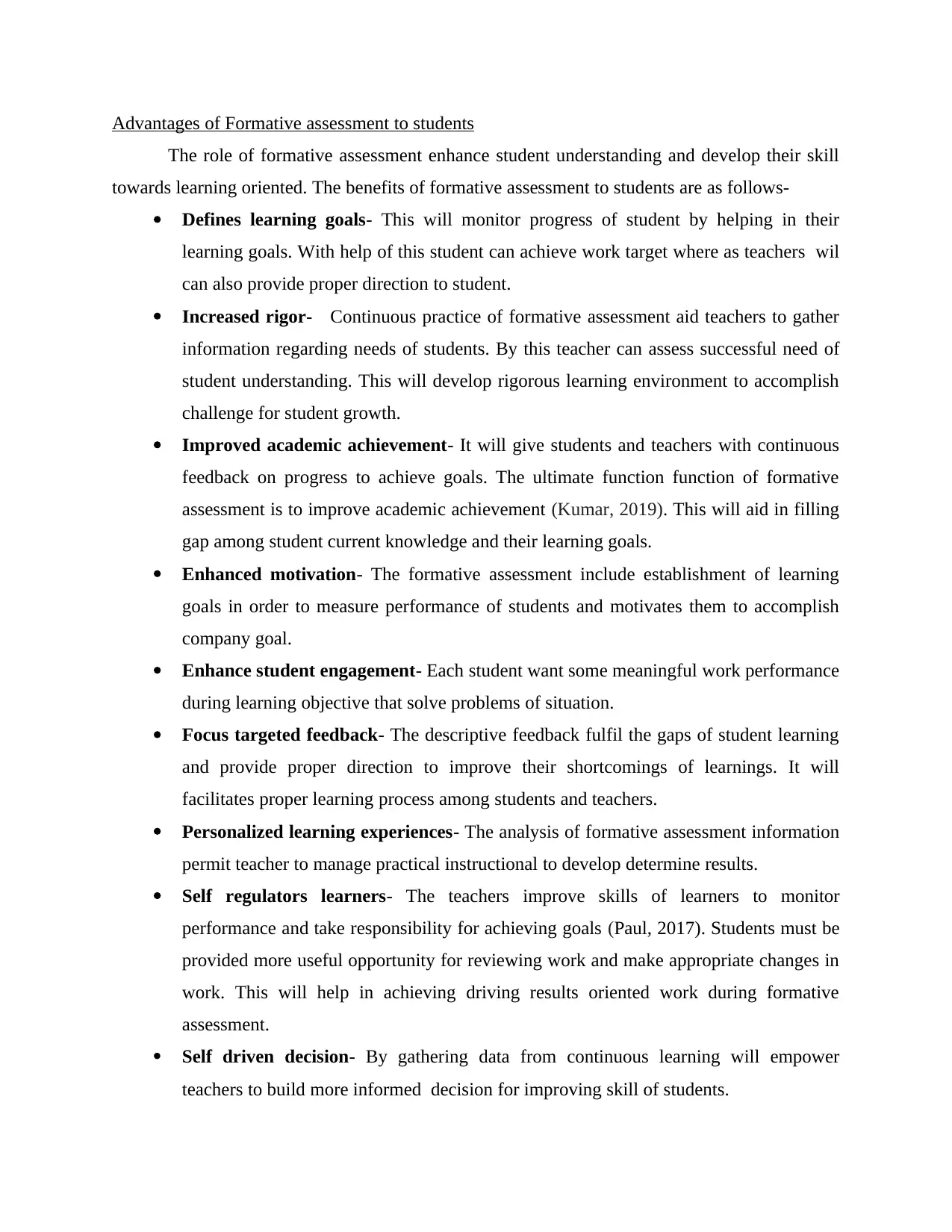
Advantages of Formative assessment to students
The role of formative assessment enhance student understanding and develop their skill
towards learning oriented. The benefits of formative assessment to students are as follows-
Defines learning goals- This will monitor progress of student by helping in their
learning goals. With help of this student can achieve work target where as teachers wil
can also provide proper direction to student.
Increased rigor- Continuous practice of formative assessment aid teachers to gather
information regarding needs of students. By this teacher can assess successful need of
student understanding. This will develop rigorous learning environment to accomplish
challenge for student growth.
Improved academic achievement- It will give students and teachers with continuous
feedback on progress to achieve goals. The ultimate function function of formative
assessment is to improve academic achievement (Kumar, 2019). This will aid in filling
gap among student current knowledge and their learning goals.
Enhanced motivation- The formative assessment include establishment of learning
goals in order to measure performance of students and motivates them to accomplish
company goal.
Enhance student engagement- Each student want some meaningful work performance
during learning objective that solve problems of situation.
Focus targeted feedback- The descriptive feedback fulfil the gaps of student learning
and provide proper direction to improve their shortcomings of learnings. It will
facilitates proper learning process among students and teachers.
Personalized learning experiences- The analysis of formative assessment information
permit teacher to manage practical instructional to develop determine results.
Self regulators learners- The teachers improve skills of learners to monitor
performance and take responsibility for achieving goals (Paul, 2017). Students must be
provided more useful opportunity for reviewing work and make appropriate changes in
work. This will help in achieving driving results oriented work during formative
assessment.
Self driven decision- By gathering data from continuous learning will empower
teachers to build more informed decision for improving skill of students.
The role of formative assessment enhance student understanding and develop their skill
towards learning oriented. The benefits of formative assessment to students are as follows-
Defines learning goals- This will monitor progress of student by helping in their
learning goals. With help of this student can achieve work target where as teachers wil
can also provide proper direction to student.
Increased rigor- Continuous practice of formative assessment aid teachers to gather
information regarding needs of students. By this teacher can assess successful need of
student understanding. This will develop rigorous learning environment to accomplish
challenge for student growth.
Improved academic achievement- It will give students and teachers with continuous
feedback on progress to achieve goals. The ultimate function function of formative
assessment is to improve academic achievement (Kumar, 2019). This will aid in filling
gap among student current knowledge and their learning goals.
Enhanced motivation- The formative assessment include establishment of learning
goals in order to measure performance of students and motivates them to accomplish
company goal.
Enhance student engagement- Each student want some meaningful work performance
during learning objective that solve problems of situation.
Focus targeted feedback- The descriptive feedback fulfil the gaps of student learning
and provide proper direction to improve their shortcomings of learnings. It will
facilitates proper learning process among students and teachers.
Personalized learning experiences- The analysis of formative assessment information
permit teacher to manage practical instructional to develop determine results.
Self regulators learners- The teachers improve skills of learners to monitor
performance and take responsibility for achieving goals (Paul, 2017). Students must be
provided more useful opportunity for reviewing work and make appropriate changes in
work. This will help in achieving driving results oriented work during formative
assessment.
Self driven decision- By gathering data from continuous learning will empower
teachers to build more informed decision for improving skill of students.
⊘ This is a preview!⊘
Do you want full access?
Subscribe today to unlock all pages.

Trusted by 1+ million students worldwide
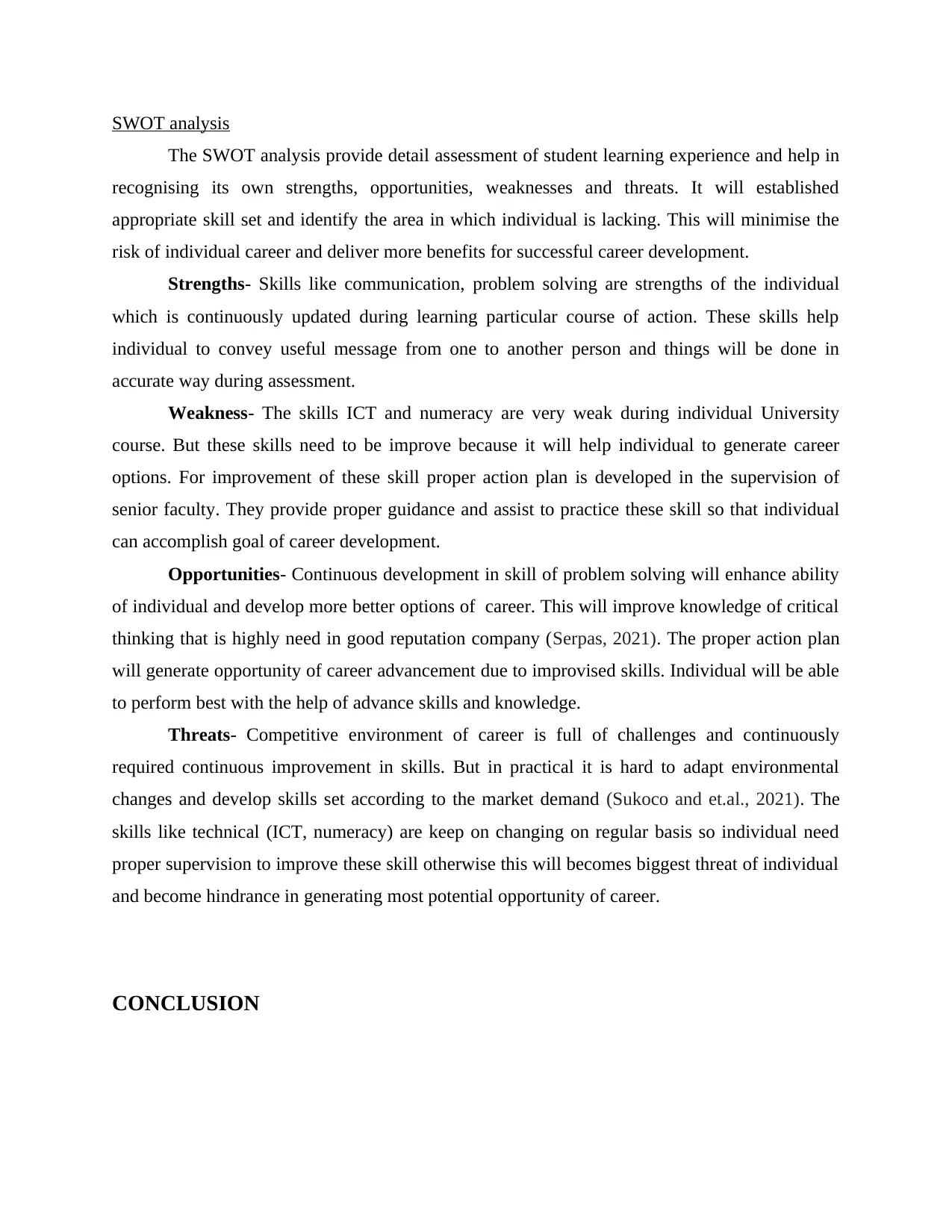
SWOT analysis
The SWOT analysis provide detail assessment of student learning experience and help in
recognising its own strengths, opportunities, weaknesses and threats. It will established
appropriate skill set and identify the area in which individual is lacking. This will minimise the
risk of individual career and deliver more benefits for successful career development.
Strengths- Skills like communication, problem solving are strengths of the individual
which is continuously updated during learning particular course of action. These skills help
individual to convey useful message from one to another person and things will be done in
accurate way during assessment.
Weakness- The skills ICT and numeracy are very weak during individual University
course. But these skills need to be improve because it will help individual to generate career
options. For improvement of these skill proper action plan is developed in the supervision of
senior faculty. They provide proper guidance and assist to practice these skill so that individual
can accomplish goal of career development.
Opportunities- Continuous development in skill of problem solving will enhance ability
of individual and develop more better options of career. This will improve knowledge of critical
thinking that is highly need in good reputation company (Serpas, 2021). The proper action plan
will generate opportunity of career advancement due to improvised skills. Individual will be able
to perform best with the help of advance skills and knowledge.
Threats- Competitive environment of career is full of challenges and continuously
required continuous improvement in skills. But in practical it is hard to adapt environmental
changes and develop skills set according to the market demand (Sukoco and et.al., 2021). The
skills like technical (ICT, numeracy) are keep on changing on regular basis so individual need
proper supervision to improve these skill otherwise this will becomes biggest threat of individual
and become hindrance in generating most potential opportunity of career.
CONCLUSION
The SWOT analysis provide detail assessment of student learning experience and help in
recognising its own strengths, opportunities, weaknesses and threats. It will established
appropriate skill set and identify the area in which individual is lacking. This will minimise the
risk of individual career and deliver more benefits for successful career development.
Strengths- Skills like communication, problem solving are strengths of the individual
which is continuously updated during learning particular course of action. These skills help
individual to convey useful message from one to another person and things will be done in
accurate way during assessment.
Weakness- The skills ICT and numeracy are very weak during individual University
course. But these skills need to be improve because it will help individual to generate career
options. For improvement of these skill proper action plan is developed in the supervision of
senior faculty. They provide proper guidance and assist to practice these skill so that individual
can accomplish goal of career development.
Opportunities- Continuous development in skill of problem solving will enhance ability
of individual and develop more better options of career. This will improve knowledge of critical
thinking that is highly need in good reputation company (Serpas, 2021). The proper action plan
will generate opportunity of career advancement due to improvised skills. Individual will be able
to perform best with the help of advance skills and knowledge.
Threats- Competitive environment of career is full of challenges and continuously
required continuous improvement in skills. But in practical it is hard to adapt environmental
changes and develop skills set according to the market demand (Sukoco and et.al., 2021). The
skills like technical (ICT, numeracy) are keep on changing on regular basis so individual need
proper supervision to improve these skill otherwise this will becomes biggest threat of individual
and become hindrance in generating most potential opportunity of career.
CONCLUSION
Paraphrase This Document
Need a fresh take? Get an instant paraphrase of this document with our AI Paraphraser
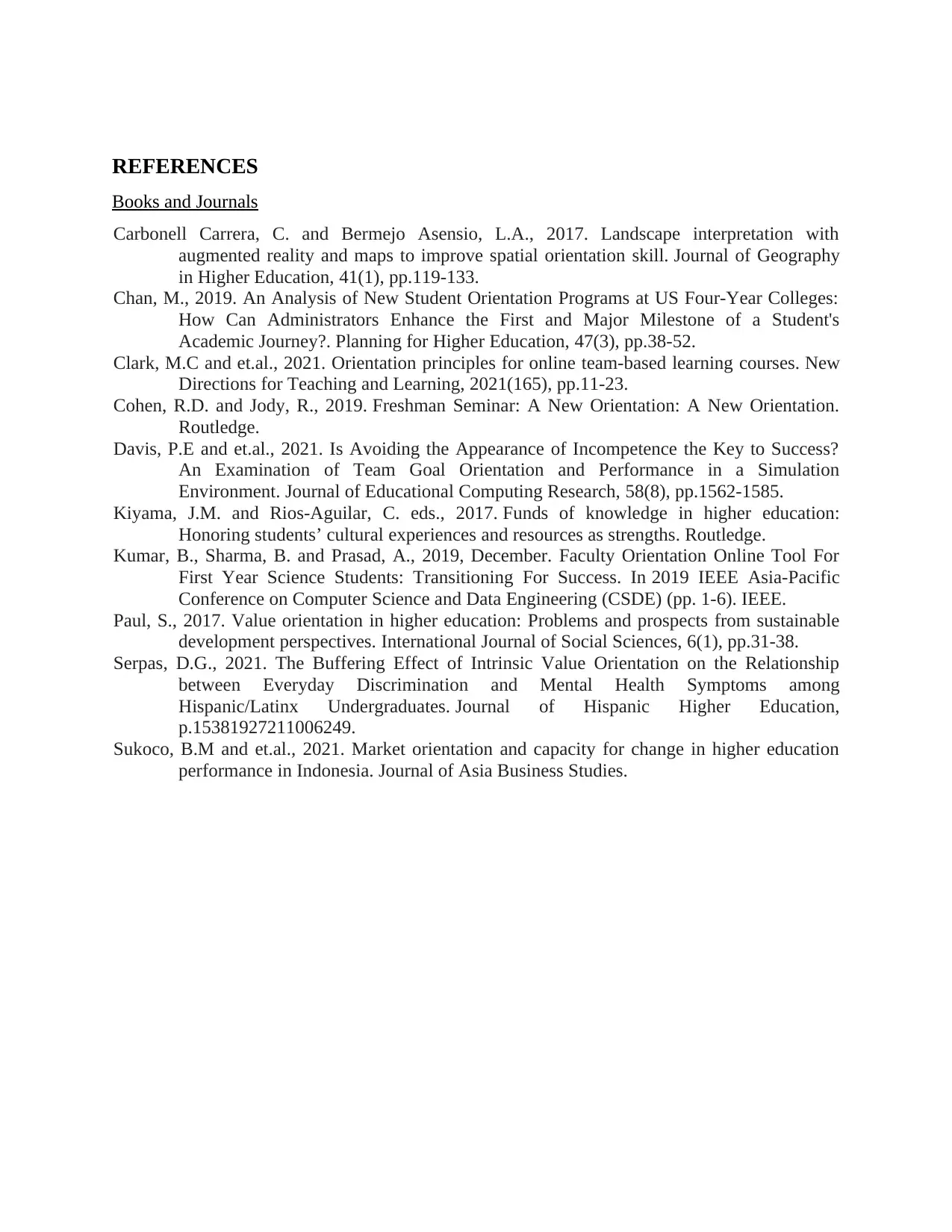
REFERENCES
Books and Journals
Carbonell Carrera, C. and Bermejo Asensio, L.A., 2017. Landscape interpretation with
augmented reality and maps to improve spatial orientation skill. Journal of Geography
in Higher Education, 41(1), pp.119-133.
Chan, M., 2019. An Analysis of New Student Orientation Programs at US Four-Year Colleges:
How Can Administrators Enhance the First and Major Milestone of a Student's
Academic Journey?. Planning for Higher Education, 47(3), pp.38-52.
Clark, M.C and et.al., 2021. Orientation principles for online team‐based learning courses. New
Directions for Teaching and Learning, 2021(165), pp.11-23.
Cohen, R.D. and Jody, R., 2019. Freshman Seminar: A New Orientation: A New Orientation.
Routledge.
Davis, P.E and et.al., 2021. Is Avoiding the Appearance of Incompetence the Key to Success?
An Examination of Team Goal Orientation and Performance in a Simulation
Environment. Journal of Educational Computing Research, 58(8), pp.1562-1585.
Kiyama, J.M. and Rios-Aguilar, C. eds., 2017. Funds of knowledge in higher education:
Honoring students’ cultural experiences and resources as strengths. Routledge.
Kumar, B., Sharma, B. and Prasad, A., 2019, December. Faculty Orientation Online Tool For
First Year Science Students: Transitioning For Success. In 2019 IEEE Asia-Pacific
Conference on Computer Science and Data Engineering (CSDE) (pp. 1-6). IEEE.
Paul, S., 2017. Value orientation in higher education: Problems and prospects from sustainable
development perspectives. International Journal of Social Sciences, 6(1), pp.31-38.
Serpas, D.G., 2021. The Buffering Effect of Intrinsic Value Orientation on the Relationship
between Everyday Discrimination and Mental Health Symptoms among
Hispanic/Latinx Undergraduates. Journal of Hispanic Higher Education,
p.15381927211006249.
Sukoco, B.M and et.al., 2021. Market orientation and capacity for change in higher education
performance in Indonesia. Journal of Asia Business Studies.
Books and Journals
Carbonell Carrera, C. and Bermejo Asensio, L.A., 2017. Landscape interpretation with
augmented reality and maps to improve spatial orientation skill. Journal of Geography
in Higher Education, 41(1), pp.119-133.
Chan, M., 2019. An Analysis of New Student Orientation Programs at US Four-Year Colleges:
How Can Administrators Enhance the First and Major Milestone of a Student's
Academic Journey?. Planning for Higher Education, 47(3), pp.38-52.
Clark, M.C and et.al., 2021. Orientation principles for online team‐based learning courses. New
Directions for Teaching and Learning, 2021(165), pp.11-23.
Cohen, R.D. and Jody, R., 2019. Freshman Seminar: A New Orientation: A New Orientation.
Routledge.
Davis, P.E and et.al., 2021. Is Avoiding the Appearance of Incompetence the Key to Success?
An Examination of Team Goal Orientation and Performance in a Simulation
Environment. Journal of Educational Computing Research, 58(8), pp.1562-1585.
Kiyama, J.M. and Rios-Aguilar, C. eds., 2017. Funds of knowledge in higher education:
Honoring students’ cultural experiences and resources as strengths. Routledge.
Kumar, B., Sharma, B. and Prasad, A., 2019, December. Faculty Orientation Online Tool For
First Year Science Students: Transitioning For Success. In 2019 IEEE Asia-Pacific
Conference on Computer Science and Data Engineering (CSDE) (pp. 1-6). IEEE.
Paul, S., 2017. Value orientation in higher education: Problems and prospects from sustainable
development perspectives. International Journal of Social Sciences, 6(1), pp.31-38.
Serpas, D.G., 2021. The Buffering Effect of Intrinsic Value Orientation on the Relationship
between Everyday Discrimination and Mental Health Symptoms among
Hispanic/Latinx Undergraduates. Journal of Hispanic Higher Education,
p.15381927211006249.
Sukoco, B.M and et.al., 2021. Market orientation and capacity for change in higher education
performance in Indonesia. Journal of Asia Business Studies.
1 out of 8
Related Documents
Your All-in-One AI-Powered Toolkit for Academic Success.
+13062052269
info@desklib.com
Available 24*7 on WhatsApp / Email
![[object Object]](/_next/static/media/star-bottom.7253800d.svg)
Unlock your academic potential
Copyright © 2020–2026 A2Z Services. All Rights Reserved. Developed and managed by ZUCOL.




